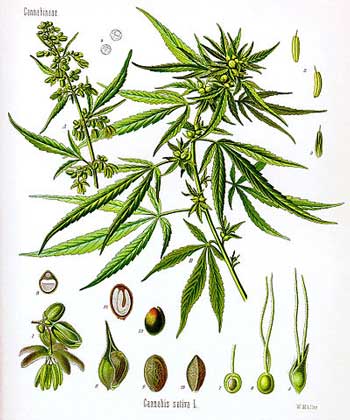Scientists at the University of East Anglia have shown how the main psychoactive ingredient in cannabis could reduce tumor growth in cancer patients.
Research published today reveals the existence of previously unknown signaling platforms which are responsible for the drug’s success in shrinking tumours.
It is hoped that the findings could help develop a synthetic equivalent with anti-cancer properties.
The research was co-led with the Universidad Complutense de Madridin, Spain. The team used samples of human breast cancer cells to induce tumours in mice. They then targeted the tumours with doses of the cannabis compound THC (Tetrahydrocannabinol). They found that two cell receptors in particular were responsible for the drug’s anti-tumour effects.
Dr Peter McCormick, from UEA’s school of Pharmacy, said: “THC, the major active component of marijuana, has anti-cancer properties. This compound is known to act through a specific family of cell receptors called cannabinoid receptors. However, it was unclear which of these receptors were responsible for the anti-tumour effects of THC.
“We show that these effects are mediated via the joint interaction of CB2 and GPR55 – two members of the cannabinoid receptor family. Our findings help explain some of the well-known but still poorly understood effects of THC at low and high doses on tumour growth.
“There has been a great deal of interest in understanding the molecular mechanisms behind how marijuana, and specifically THC, influence cancer pathology.
“There has also been a drive in the pharmaceutical industry to create synthetic equivalents that might have anti-cancer properties.
“By identifying the receptors involved we have provided an important step towards the future development of therapeutics that can take advantage of the interactions we have discovered to reduce tumour growth.”
Dr McCormick added that cancer sufferers should not be tempted to self-medicate.
“Our research uses an isolated chemical compound and using the correct concentration is vital. Cancer patients should not use cannabis to self-medicate, but I hope that our research will lead to a safe synthetic equivalent being available in the future.”
‘Targeting CB2 –GPR55 receptor heteromers modulates cancer cell signalling’ is published in the Journal of Biological Chemistry.
If our reporting has informed or inspired you, please consider making a donation. Every contribution, no matter the size, empowers us to continue delivering accurate, engaging, and trustworthy science and medical news. Independent journalism requires time, effort, and resources—your support ensures we can keep uncovering the stories that matter most to you.
Join us in making knowledge accessible and impactful. Thank you for standing with us!

